Why is this Indian giving $200m to Florida?
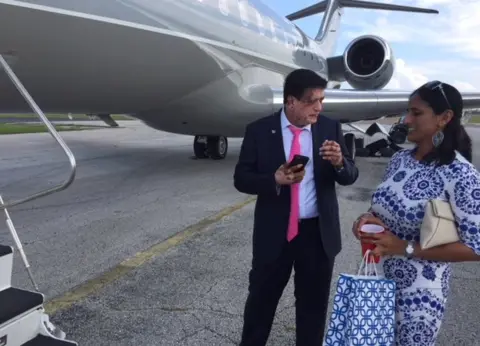 BBC
BBCA cohort of Indian-Americans who have made their fortune in the US are increasingly turning to large-scale philanthropy. Kiran Patel's giant gift to a Florida university is the new high-water mark.
Every day at school, eight-year-old Kiran Patel would watch longingly as his younger brother and friends snacked on chocolate and soda bought with their pocket money. His one shilling a day pocket money could easily pay for those goodies. But to him it was a waste - he dropped it in a piggy bank instead.
In a few years, he had saved enough to buy the ship fare from Zambia to India for himself, his parents and his two siblings - their first trip home in 12 years.
Six decades later, Dr Kiran C Patel recounts the story aboard his 14-seater private Bombardier jet on his way to Tampa, Florida. He has come a long way from that small town in Zambia.
Just hours prior, he and his wife, Dr Pallavi Patel, pledged $200m to a Florida university - the largest donation ever from an Indian-American to a US institution. Nova Southeastern University (NSU) will use the gift to create two medical colleges - one in Florida, another in India.
"I learnt a few very early lessons in life," he says. "A penny saved is a penny earned and one should drop it where it makes the maximum impact."
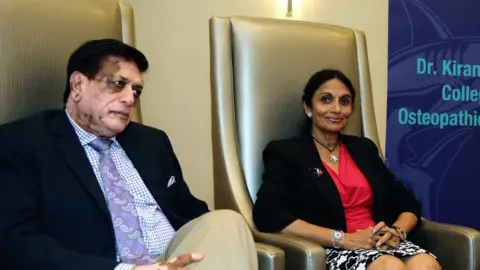
Patel grew up in the era of racial segregation in Zambia, where he had to move 80km to go to school as there was none in his town for non-white students. He attended medical school in India and moved to the US with his wife, also a medical doctor, on Thanksgiving Day in 1976.
Patel went from cardiologist to businessman when he created a network of physicians with different specialities. But the real breakthrough came in 1992 when he took over a health insurance company on the verge of bankruptcy.
Ten years later when the Patels sold the firm, it had more than 400,000 members and revenue in excess of $1bn. His business empire is not without controversy - earlier this year, two of his businesses paid more than $30m in a settlement after accusations of artificially inflating costs for care. The firm has not admitted wrongdoing as part of the settlement.
Patel likes to call himself an "aggressive entrepreneur" and believes in the old Gujarati adage "When the goddess of wealth comes knocking, don't run away to wash your face".
"I'm a risk taker and a 90 miles per hour guy, always pressing the accelerator," he says, then points to his wife of 44 years Dr Pallavi Patel. "She is the one who applies the brakes."
In recent years, many successful Indian-Americans have changed their giving habits, moving from donations to temples and religious institutions to using their newly acquired wealth to shape societies back home and in the United States.
The Patels are not alone in the scale of their givings. New York couple Chandrika and Ranjan Tandon pledged $100m to the NYU School of Engineering in 2015. The Sanju Bansal foundation provides backing to a number of non-profits and foundations in the Washington, DC area.
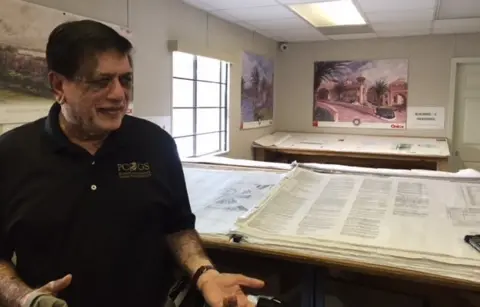
Patel says philanthropy would be part of his life even if he wasn't rich.
"My father didn't have a lot but be it in Zambia or Gujarat he was always helping those who were in need," he says.
Among the biggest beneficiaries of the Patels' largesse is the University of South Florida, where they established a research centre focused on solving problems in the developing world in a sustainable way, and a Tampa arts conservatory.
They also fund a number of initiatives in India, including a 50-bed hospital in a Gujarat village.
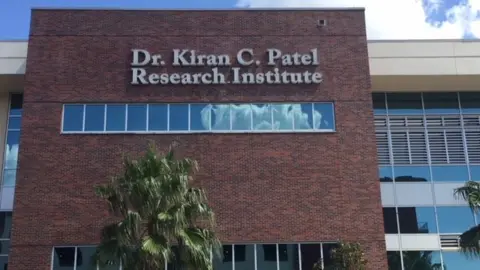
Patel says $50m of his donation to NSU will go directly to the school and $150m will go towards building a medical education complex in nearby Clearwater.
The aim is partly to improve healthcare in India and Zambia and to train healthcare professionals in these countries at an affordable cost.
The ultimate plan is to have Florida students get practical experience in India, and Indian students spend a year at the Florida school.
By bringing American-style education to India, the philanthropist says he will be able to reduce the expenses considerably.
"A Zambian student can stay in India for less than $2,000, including accommodation and food," Patel says. "We are able to help thousands of people, and at the same time provide the same quality of education as imparted in the US."
American students in India will benefit from exposure to a lots of different diseases and health situations, he says.
"To stretch the same dollar to impact 10-fold, 20-fold, 100-fold, that's what I enjoy," he says.
What he also seems to enjoy, though, is grandiose spending.
In the last five years, he purchased four private jets and is halfway through building a palace-like home that's talk of the town in Tampa, Florida.
The nearly-40 bedroom mansion, built entirely in red sandstone shipped from India, is impossible to miss. More than 100 people have been working on it for the past five years. When it's finished, Patel hopes three generations of his family will live in it - including his three children and several grandchildren.
So what would he say to the child who thought spending a shilling on soda and snacks was a waste?
"I like to have the best," he says. "I know many will criticise me for this extravagance but some will also say - why not?"
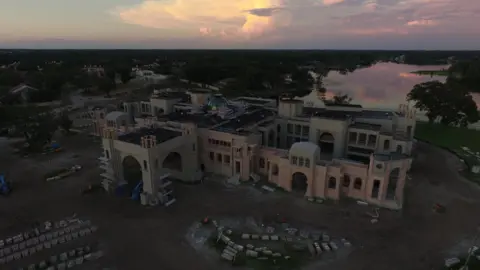
His wife says flying in private jets or owning beachfront properties doesn't make them any happier than what they felt as a middle-class family.
"He has given more than he has splurged on himself," she says. "I think he has earned the right to enjoy as well."
She says her husband is still frugal at heart, and that's how he's brought up his children.
When their son, Shilen, was nine, he returned from school one afternoon and asked, "Dad, are we rich?"
They were taken aback, but her husband responded: "Maybe I am rich but you are not."
"This is how we reminded them that they have to make their life on their own," she says.
